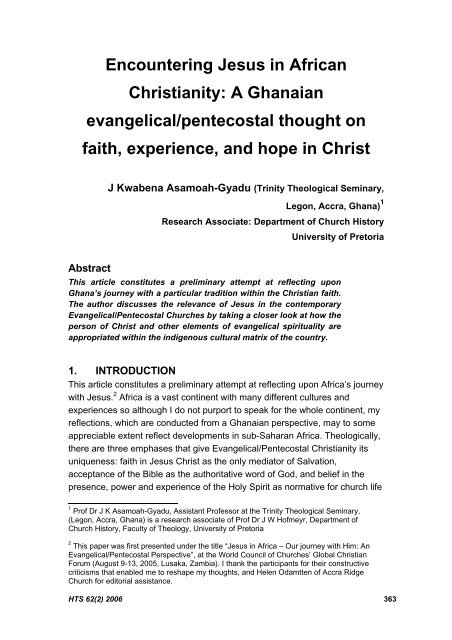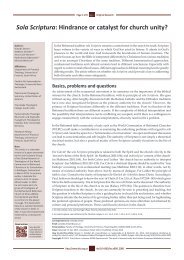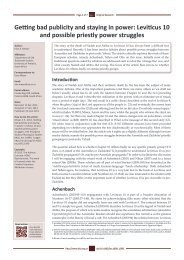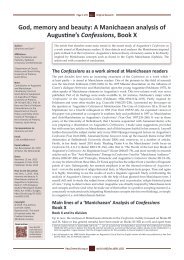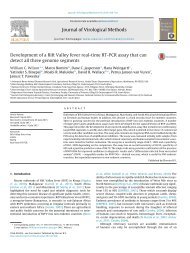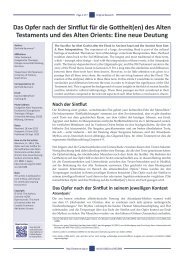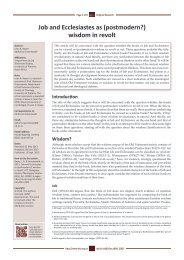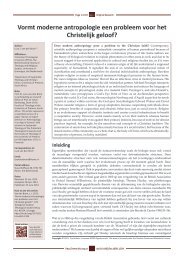Print this article - HTS Teologiese Studies / Theological Studies
Print this article - HTS Teologiese Studies / Theological Studies
Print this article - HTS Teologiese Studies / Theological Studies
Create successful ePaper yourself
Turn your PDF publications into a flip-book with our unique Google optimized e-Paper software.
Encountering Jesus in African<br />
Christianity: A Ghanaian<br />
evangelical/pentecostal thought on<br />
faith, experience, and hope in Christ<br />
Abstract<br />
J Kwabena Asamoah-Gyadu (Trinity <strong>Theological</strong> Seminary,<br />
Legon, Accra, Ghana) 1<br />
Research Associate: Department of Church History<br />
University of Pretoria<br />
This <strong>article</strong> constitutes a preliminary attempt at reflecting upon<br />
Ghana’s journey with a particular tradition within the Christian faith.<br />
The author discusses the relevance of Jesus in the contemporary<br />
Evangelical/Pentecostal Churches by taking a closer look at how the<br />
person of Christ and other elements of evangelical spirituality are<br />
appropriated within the indigenous cultural matrix of the country.<br />
1. INTRODUCTION<br />
This <strong>article</strong> constitutes a preliminary attempt at reflecting upon Africa’s journey<br />
with Jesus. 2 Africa is a vast continent with many different cultures and<br />
experiences so although I do not purport to speak for the whole continent, my<br />
reflections, which are conducted from a Ghanaian perspective, may to some<br />
appreciable extent reflect developments in sub-Saharan Africa. <strong>Theological</strong>ly,<br />
there are three emphases that give Evangelical/Pentecostal Christianity its<br />
uniqueness: faith in Jesus Christ as the only mediator of Salvation,<br />
acceptance of the Bible as the authoritative word of God, and belief in the<br />
presence, power and experience of the Holy Spirit as normative for church life<br />
1 Prof Dr J K Asamoah-Gyadu, Assistant Professor at the Trinity <strong>Theological</strong> Seminary,<br />
(Legon, Accra, Ghana) is a research associate of Prof Dr J W Hofmeyr, Department of<br />
Church History, Faculty of Theology, University of Pretoria<br />
2 This paper was first presented under the title “Jesus in Africa – Our journey with Him: An<br />
Evangelical/Pentecostal Perspective”, at the World Council of Churches’ Global Christian<br />
Forum (August 9-13, 2005, Lusaka, Zambia). I thank the participants for their constructive<br />
criticisms that enabled me to reshape my thoughts, and Helen Odamtten of Accra Ridge<br />
Church for editorial assistance.<br />
<strong>HTS</strong> 62(2) 2006 363
Encountering Jesus in African Christianity<br />
today. Of these three, the most fundamental is the exercise of faith in, and the<br />
experience of, Jesus Christ as one’s Lord and personal Savior. The other two<br />
are dependent upon <strong>this</strong> one. Historically classical Pentecostals for instance<br />
identify with a four-fold pattern of theological emphasis. These are Jesus<br />
Christ as Savior, as Healer, as Baptizer in the Holy Spirit, and as a “Soon<br />
Coming King.”<br />
Taken together <strong>this</strong> four-fold theological emphases, as we can see, are<br />
dependent on Jesus Christ as Lord, and as the focus of faith, experience, and<br />
hope. The Evangelical/Pentecostal emphasis on experiencing Jesus Christ as<br />
the entry point into Christianity fits the proposition of I M Lewis that<br />
“experience” is critical to religious belief. In his book Ecstatic Religion, Lewis<br />
refers to three main characteristics of religion: faith, belief, and experience<br />
and of these three, the greatest is “religious experience” (Lewis 2003). The<br />
Apostle Peter also drew attention to the importance of experience in response<br />
to the query of his listeners, “what shall we do”:<br />
Repent of your sins and be baptized in the name of the Lord Jesus<br />
Christ for the forgiveness of sins, and you shall receive the gift of<br />
the Holy Spirit, for the promise is for you and your children, and for<br />
those who are afar off.<br />
(Acts 2:38-39)<br />
This text has become one of the main biblical passages that<br />
Evangelical/Pentecostal Christians would usually cite for theological<br />
legitimacy as far as their stream of Christianity is concerned. I am not<br />
oblivious of the debate regarding what it means to “receive the Holy Spirit”.<br />
<strong>Theological</strong>ly, the insistence on personal conscious decisions to accept Jesus<br />
Christ as Savior as the most important indicator of Christian commitment<br />
unites Evangelicals and Pentecostals. Those who insist on belief in, and<br />
experience of, Jesus Christ as Savior and tenaciously bear witness to that<br />
creed are often labeled pejoratively as “Christian fundamentalists”. For<br />
example, a 2005 BBC Focus on Africa magazine report refers to “Evangelical<br />
Christianity” as, a “fundamentalist version of the Protestant faith” (Goffe<br />
2005:11-12). The authors give the erroneous impression that African<br />
Evangelical/Pentecostal Christianity is of North American import, which is<br />
thriving in Africa as a result of the vulnerability of the continent in the face of<br />
poverty, disease, and squalor.<br />
This image of Evangelical/Pentecostal Christianity is false. The<br />
argument that Africa’s new Christianity is a clone of North American Christian<br />
fundamentalism ignores the internal dynamics of transformative religious<br />
encounters around which the testimonies of African Christians revolve.<br />
364 <strong>HTS</strong> 62(2) 2006
J Kwabena Asamoah-Gyadu<br />
A number of these crisis-conversion testimonies were the first steps towards<br />
the formation of indigenous churches in Africa following the early western<br />
missionary era. African Christians are in church because they have<br />
encountered Jesus Christ in profound ways that are reminiscent of similar<br />
encounters in the Bible such as that of St Paul on the road to Damascus. In<br />
other words Christianity is thriving in Africa because of the African<br />
Reformation led by the independent indigenous Evangelical, Pentecostal, and<br />
Charismatic churches and movements on the continent. Most of these<br />
constitute novel African initiatives in Christianity. The quantitative proliferation<br />
of churches of Evangelical/Pentecostal persuasions has led to a qualitatively<br />
new religious atmosphere as far as African church life is concerned.<br />
2. THE PASSION OF THE CHRIST: AN AFRICAN<br />
EVANGELICAL/PENTECOSTAL RESPONSE<br />
The most important thing for our purposes, as far as the BBC report is<br />
concerned, is that different streams of Evangelical/Pentecostal Christian<br />
churches and movements form the growing edges of Christianity in Africa. Of<br />
that there is no doubt, and <strong>this</strong> has occurred as a result of Africa’s journey<br />
with Jesus Christ. The different responses to the film of the moment, The<br />
Passion of the Christ, elucidate the meaning of Simeon’s “rising” and “falling”<br />
in respect of the mission of Christ. The insistence on experiencing Jesus<br />
Christ has proven highly divisive especially in a world of religious pluralism<br />
and alternative spiritualities and lifestyles. There have been very critical<br />
reviews of Mel Gibson’s film. Most of the criticisms accuse Gibson of<br />
“glorifying violence”. Public protests have also been mounted against what<br />
some consider a Gibson anti-Semitic agenda. On both occasions that I<br />
watched the film myself, I wept on account of the horrific pain that I envisioned<br />
Christ endured for me.<br />
Responses to the film from Africa, especially from<br />
Evangelical/Pentecostal Christians, have generally followed <strong>this</strong> emotional line<br />
of faith. “Believers” on the continent, as Evangelical/Pentecostal Christians<br />
usually called themselves, have dwelt more on the salvific, transformative or<br />
experiential impact of the message of the film, than on its offence to personal<br />
and racial sensibilities. I quote below the representative view of an<br />
Evangelical career laywoman and church leader from Ghana who said she<br />
had watched The Passion of the Christ. She did so in the company of a pastor<br />
after which she sent me a personal letter that read in part:<br />
<strong>HTS</strong> 62(2) 2006 365
Encountering Jesus in African Christianity<br />
My Easter was good. I watched The Passion of the Christ on<br />
Sunday afternoon … with Pastor Andrew. … I made the decision [to<br />
go] and I am glad I went. I cried, … but so did Pastor Andrew. A few<br />
people I talked to were left speechless, and said they needed time<br />
to reflect. “Overwhelmingly stunned into silence and reflection”,<br />
could be a summary of the reaction of the few I spoke to. Pastor<br />
Andrew and I could not talk for a long time in the car. All I could<br />
think about when watching the film was that I couldn’t afford to live<br />
anyhow since Jesus suffered so much for me! … Now I appreciate<br />
what the Scriptures mean by saying the he broke his body and<br />
shed his blood for our iniquities … “God, please change my heart<br />
and let me yearn for the things you yearn after, and let me desire<br />
the things you desire, but above all, let me exercise my will for you.<br />
Amen. That is my prayer”. 3<br />
This representative African Christian response to Gibson’s film is typically<br />
Evangelical as it articulates for us the various dimensions of<br />
Evangelical/Pentecostal Christianity. The first response, “I couldn’t afford to<br />
live anyhow since Jesus suffered much for me”, focuses on the reality of the<br />
story of Christ; the second response, “I appreciate what the Scriptures mean<br />
by saying he broke his body and shed his blood”, affirms belief in the authority<br />
of the Scriptures; and the third response, which is a prayer, to “exercise my<br />
will for God”, affirms the social import of Evangelical/Pentecostal faith.<br />
John Stott points out in his recent work, The Incomparable Christ, that<br />
Jesus is “the center of history”, “the focus of Scripture”, and the “heart of<br />
mission”. Evangelicalism usually stresses the power of the Word.<br />
Pentecostalism takes the matter further by its emphasis and active promotion<br />
of the experiential presence of the Holy Spirit in new tongues, healing,<br />
deliverance, revelations, and other such pneumatic phenomena. In African<br />
initiated Christianity, the Evangelical emphasis on the power of the Word and<br />
the Pentecostal emphasis on the power of the Spirit are usually not mutually<br />
exclusive. Indeed sub-Saharan African Christianity, as I know it, rarely draws<br />
hard and fast distinctions between Evangelicalism and Pentecostalism. This is<br />
perhaps as it should be, for as Stott would have it, “salvation” has two<br />
components, “forgiveness” and “transformation”. “Forgiveness”, he writes,<br />
“eradicates our past”, and the Spirit, he says, “transforms our future” (Stott<br />
2001:33). Taken together <strong>this</strong> way, I will contend that Evangelical/Pentecostal<br />
Christianity in Africa would have three main facets as far as the journey with<br />
3 Letter written to me in April 2004. The writer worships with a thoroughly Evangelical<br />
congregation, the Legon Inter-denominational Church, located on the campus site of the<br />
University of Ghana, Legon. She is a manager with a reputable international bank in Ghana<br />
and has recently participated in the Leadership Training Seminar offered by the Haggai<br />
Institute in Singapore. The quotation here is used with permission.<br />
366 <strong>HTS</strong> 62(2) 2006
J Kwabena Asamoah-Gyadu<br />
Jesus is concerned. These are the doctrinal/theological, moral/ethical, and<br />
social/political facets of Christian expression. The task that faces us in Africa<br />
as we walk with Jesus is how to translate these three dimensions into<br />
practical everyday actions that affect persons, churches, and ecumenical<br />
relations.<br />
3. AFRICA, JESUS CHRIST, AND THE CHOICES OF FAITH<br />
To begin with, Africa, like the early church, has had to make some difficult<br />
choices in her journey with Jesus. This includes the reformation of Christianity<br />
in order that it might cater for indigenous worldviews of mystical causality,<br />
incorporate divine healing into the theological agenda, and integrate<br />
charismatic renewal phenomena into worship. For example, leaders of<br />
Christian religious innovation in Africa faced fierce resistance from colonial<br />
authorities and historic mission denominations in their attempts to initiate new<br />
paradigms in Christianity, that it may address African theological concerns.<br />
Nonetheless new visions of Jesus have continued to create new altars in<br />
Africa and the result has been the massive expansion and indigenization of<br />
Christianity under the leadership of local Christians. Notable are the efforts of<br />
prophets William Wade Harris, Joseph Babalola and Garrick Sokari Braide of<br />
West Africa, Simon Kimbangu of the DR Congo, Isaiah Shembe of South<br />
Africa, and those who have carried the mantles of these prophets forward,<br />
leading to the rise of old and new independent indigenous<br />
Evangelical/Pentecostal, and Charismatic Christian churches of different<br />
persuasions. In almost every case, the desire has been to return to the<br />
Christianity of Jesus as read in the vernacular Bible.<br />
This point can be aptly illustrated with the case of William Egyanka<br />
Appiah of Ghana. This early 20 th century Methodist catechist had established<br />
a Prayer Camp to help members of his church make up for the perceived lack<br />
of spiritual emphasis in the life of the church. Catechist Appiah’s story as<br />
narrated by Christian G Baëta (1962:31) states in part:<br />
On the 18 th of August 1919, when Appiah was praying in the<br />
“camp”, he heard a noise as of a great crowd singing and praising<br />
God. As he listened the Angel of the Lord revealed himself to him,<br />
coming towards him with a Bible in his hand, opened at the 10 th<br />
chapter of the Book of Acts of the Apostles, and pointing out <strong>this</strong><br />
chapter to him. Then God’s Spirit descended upon Appiah. When<br />
<strong>this</strong> revelation was ended, Appiah realized that he had become a<br />
new man. He began to speak in a new tongue, and from that time<br />
onward he performed many miracles.<br />
<strong>HTS</strong> 62(2) 2006 367
Encountering Jesus in African Christianity<br />
In 1923, Catechist Appiah’s new superintendent minister, Gaddiel Acquaah,<br />
interpreted Appiah’s new experience as belonging to the “occult” and not in<br />
keeping with Methodist tradition. Catechist Appiah felt unable to obey an<br />
injunction to stop what his superintendent referred to as “occult activities”. He<br />
was thus forced to leave the Methodist Church (Baëta 1962:75). The result of<br />
that walkout was the formation of the Musama Disco Christo Church or “The<br />
Army of the Cross of Christ Church”. Catechist Appiah’s experience is one<br />
example of similar developments across Africa at the turn of the 20 th century. I<br />
find Lamin Sanneh’s (1983:180) summary of their contribution to the African<br />
Christian enterprise very accurate:<br />
A process of internal change was thus initiated in which African<br />
Christians sought a distinctive way of life through mediation of the<br />
Spirit, a process that enhanced the importance of traditional<br />
religions for the deepening of Christian spirituality. … Biblical<br />
material was submitted to the regenerative capacity of African<br />
perception, and the result would be Africa’s unique contribution to<br />
the story of Christianity.<br />
The contributions of the older African Reformation churches have been<br />
sustained, and we find continuities in their theological emphases and in those<br />
of the new charismatic churches burgeoning throughout the continent. The<br />
two groups of churches address themselves to the lacuna in the rationalist<br />
theologies of historic mission denominations although <strong>this</strong> has been done<br />
within different historical and even ecclesial contexts.<br />
4. ISSUES FACING AFRICAN CHRISTIANITY<br />
The issues facing Africa in her walk with Jesus are many, and straddle all<br />
areas of life. In spite of whatever theological flaws found in the various<br />
streams of Christianity in Africa, the faith is growing because the churches, led<br />
by the Evangelical/Pentecostal streams in particular, have made certain<br />
difficult but evangelically necessary choices. These choices as I argue in<br />
African Charismatics, have helped to sustain the Christian faith in Africa<br />
through effective inculturation, the normalization of charismatic experiences in<br />
Christian worship, practical views of salvation, the employment of oral<br />
theological discourses, and an innovative gender ideology (Baëta 2005:35-<br />
59). Several other challenges have emerged including how to respond to the<br />
challenge of HIV AIDS.<br />
368 <strong>HTS</strong> 62(2) 2006
J Kwabena Asamoah-Gyadu<br />
HIV AIDS has been made an African problem yet the solution is usually<br />
driven by western donor mindsets and agenda. African Christians have<br />
generally found the promotion of condom use over and above abstinence from<br />
pre-marital sex and marital fidelity unacceptable. In response<br />
Evangelical/Pentecostal churches and fellowships have continuously drawn<br />
attention to the fact that what the Bible teaches is that sex outside marriage<br />
and adultery are sinful in the eyes of the Lord. Unfortunately, adequate credit<br />
has not been given to the fact that the insistence of African<br />
Evangelical/Pentecostal Christianity on abstinence and the large number of<br />
young people in church who are taught that Jesus is against premarital sex<br />
has done much to help control the spread of the disease on the continent. I<br />
contend that the HIV and AIDS situation in Africa which is considered bad<br />
would have been worse without the Evangelical/Pentecostal “fundamentalist”<br />
approach to the issue of premarital sex and marital infidelity.<br />
There are other challenges such as the imposition of the Sharia law in<br />
some parts of Africa, the theological response to dehumanizing cultural<br />
practices, the unavailability of the Scriptures in many vernacular languages<br />
and the dangers posed by the emphasis on “prosperity gospel” found in many<br />
of the new Pentecostal churches. There is also the question of the patriarchal<br />
nature of African church leadership, and how to bridge the gap between<br />
academic theology and the African oral/grassroots theological discourses to<br />
achieve relevance in ministerial formation and education. In addition, there is<br />
an ardent desire for Evangelical/Pentecostal theological education at the<br />
tertiary level that has led to the rise of many Bible Schools some of which are<br />
obviously of dubious origins and quality.<br />
5. STANDING UP FOR JESUS<br />
In matters relating to Evangelical/Pentecostal Christianity, the primary aim of<br />
those who make the choices whether on the doctrinal/theological and<br />
moral/ethical sides of our three dimensions of Christian expression is to be on<br />
the side of Jesus Christ guided by faith in the Bible. Let us consider two<br />
issues and the responses to them on <strong>this</strong> premise. First, there is the case of<br />
the Ugandan Bishop who refused badly needed financial aid for HIV and AIDS<br />
programs because he believed that the Episcopal Church in the USA had<br />
compromised the gospel by electing a gay priest as bishop. It was reported in<br />
the London Guardian of Tuesday, March 22, 2005 that Jackson Nzerebende<br />
Tembo, the Bishop of South Rwenzori in Uganda had rejected the sum of<br />
$350,000 from the USA Diocese of Central Pennsylvania, because its clergy<br />
and their bishop, Michael Creighton, had endorsed the election of Jean<br />
<strong>HTS</strong> 62(2) 2006 369
Encountering Jesus in African Christianity<br />
Robinson as Bishop of New Hampshire in 2003. In a statement released to an<br />
American conservative Episcopalian website, Bishop Nzerebende affirmed:<br />
South Rwenzori Diocese upholds the Holy Scriptures as the true<br />
word of God … Of course [the rejection of the grant] will affect<br />
some of our programs. This includes our AIDS programs and the<br />
money they have been sending for … orphans’ education. We pray<br />
and believe that our God who created and controls silver and gold<br />
in the world will provide for the needs of His people.<br />
6. TO DRUM OR NOT TO DRUM<br />
The second case has to do with a raging controversy between<br />
Evangelical/Pentecostal Christians in Ghana and traditional religious<br />
authorities regarding certain ritual injunctions associated with festivals. The<br />
Ga-Dangme peoples of the capital Accra, for example, are angered by the fact<br />
that Evangelical/Pentecostal Christians in particular flout traditional injunctions<br />
prohibiting “drumming and noise-making” during “sacred periods” of the year.<br />
These bans are imposed for varying periods of time, usually for up to one<br />
month. They are considered sacred periods during which noisy activities are<br />
suspended for prayer to be made to the appropriate deities so that economic<br />
activities which they control like fishing, farming, and hunting, may continue to<br />
prosper. The churches contest the religious implications of these bans.<br />
Historic mission denominations have in the past complied not so much out of<br />
respect for traditional custom, but to avoid trouble. Evangelical/Pentecostal<br />
churches have, on the other hand, been adamant that the observance of<br />
traditional injunctions on “drumming and noisemaking” imposed by the<br />
traditional authorities are un-Christian. Their observance is thus tantamount to<br />
a tacit approval of the authority of the gods/deities over the affairs of the<br />
Christian community and compromises the lordship of Jesus Christ.<br />
In one case, affecting the Half Assini area in the Western Region of<br />
Ghana in the early 1990s, structures of the Church of Pentecost were burnt to<br />
ashes and in the religious power contests that ensued, some traditional<br />
people lost their lives mysteriously. In the interpretation of the Pentecostal<br />
pastor who led the Christian resistance, “the power of darkness had ruled the<br />
place for a long time and we believed it was now the appointed time for us<br />
through the Holy Spirit and the power of God, to wage war against these<br />
domineering and territorial evil spirits of Nzemaland” (Koree 1994:4). The<br />
injunction was fiercely resisted and by the time the matter was resolved, there<br />
had been several “casualties”, including the conversion of a leading traditional<br />
chief who openly confessed that the God of the Christians had prevailed.<br />
370 <strong>HTS</strong> 62(2) 2006
J Kwabena Asamoah-Gyadu<br />
What makes <strong>this</strong> case an interesting one is the position of the Pentecostal<br />
pastor that the Christian community knew they could worship God without<br />
drumming and noisemaking. However, on that particular occasion, the<br />
traditional injunction had to be disobeyed because in his words, it must be<br />
done if and only if as Christians, “we observed it out of own WILL and by the<br />
inspiration of the Holy Spirit, who leads us to DO and to WILL, according to<br />
his purpose” (Koree 1994:5).<br />
The rejection of the HIV AIDS grant, in my understanding, did not mean<br />
the Ugandan Bishop did not consider gay and lesbian people human. It is<br />
simply that in a world of growing moral compromises rather than absolutes,<br />
materialism, and secularism, Evangelical/Pentecostal Christians in Africa have<br />
had to take a stance on various difficult issues. This stand is made in the<br />
attempt to reach out to all people, including people with “alternative lifestyles”<br />
and still be faithful to the gospel of Jesus Christ, as they understand it from<br />
the biblical viewpoint. It is with the same understanding that the Ghanaian<br />
Christians responded to the ban on drumming and noisemaking. In the<br />
modern West, modernity, which implies the application of systematic<br />
rationality, science and technology to appropriate nature to service human<br />
ends and problems, has generally engendered anti-supernaturalism, religious<br />
rationalism, unbelief and moral relativism leading to the relegation of religion<br />
to the private realm. In Africa, experiencing Jesus Christ and living for him is<br />
still very much at the heart of Evangelical/Pentecostal Christianity, and <strong>this</strong> I<br />
believe is why the faith has taken “refuge” in Africa so that its theological and<br />
moral absolutes might be preserved to the glory of God.<br />
7. JESUS OF AFRICA AND GLOBAL CHRISTIANITY<br />
In our journey with Jesus, the influence of Evangelical/Pentecostal Christianity<br />
in Africa has, geographically speaking, transcended the continent. Africans<br />
lead some of the largest Christian congregations in both Western and Eastern<br />
Europe. I speak here of the London-based Kingsway International Christian<br />
Center led by Matthew Ashimolowo and the Kiev-based Church of the<br />
Embassy of God for all Nations led by Sunday Adelaja. Pastor Ashimolowo’s<br />
church consists mainly of West Africans. Pastor Adelaja’s church has more<br />
than 20,000 registered members and more than 90% of them are Eastern<br />
Europeans from Ukraine and Russia. What is common to the various<br />
developments that have engaged our attention is the decided<br />
Evangelical/Pentecostal focus of the spiritualities of the churches and<br />
movements involved. Wilbert R Shenk puts the accession of African<br />
<strong>HTS</strong> 62(2) 2006 371
Encountering Jesus in African Christianity<br />
Christianity and the recession of the faith in the western world in the<br />
perspective of Christian mission:<br />
A leitmotif running through the modern period is the bankruptcy of<br />
Christendom as carrier of Christian reality. … How dare anyone<br />
claim that Western culture is Christian? The tension produced by<br />
the discrepancy between churchly reality and official creed has<br />
caused concerned people in every generation to press for the<br />
renovation of the church so that it might live wholly under the<br />
lordship of Jesus Christ.<br />
(Shenk 1995:12)<br />
Indeed Diane B Stinton (2004:3) begins her study on Jesus of Africa with the<br />
poignant statement that, “at the heart of the Christian faith is the person of<br />
Jesus Christ.” Stinton proceeds to reconstruct African Christology through a<br />
careful synthesis of academic and popular writings, thoughts, and experiences<br />
of Jesus Christ. The reconstruction is conducted under four main functions of<br />
Jesus Christ: “life-giver”, “mediator”, “loved one”, and “leader”. These<br />
christological models are examined in juxtaposition with African traditional<br />
concepts such as those on ancestors, healers, and chieftaincy. Stinton’s data<br />
gathered from popular conceptions, shows how in the popular imagination,<br />
Jesus functions as the ultimate source of “true salvation”, which encapsulates<br />
health, healing, mediation, and liberation” (Stinton 2004:180, 204, 251).<br />
In the role of Jesus as “life-giver”, for example, Stinton makes the point<br />
that in spite of the reluctance of Western mission agents to imagine him as<br />
healer, ordinary African Christians nonetheless view him in <strong>this</strong> traditional role.<br />
The perception of Jesus as healer is so central to popular African Christology<br />
that all the other images could be said to hinge on it. The relevance of African<br />
Evangelical/Pentecostal Christianity is therefore located in <strong>this</strong> ability to<br />
propagate a powerful and efficacious practice of Christianity that promises<br />
freedom not simply from sin, but also from the dangers and troubles of life.<br />
God, it is thought, can be experienced in the midst of his children in very<br />
demonstrable ways. This broad view of salvation as encapsulating new life,<br />
healing, and intervention in all its forms, is usually expressed through African<br />
oral theology at the grassroots.<br />
8. SALVATION IN GRASSROOTS/ORAL THEOLOGY<br />
A great deal has been achieved in the attempt to bridge the gap between<br />
oral/grassroots theology and academic theology since the days when scholars<br />
372 <strong>HTS</strong> 62(2) 2006
J Kwabena Asamoah-Gyadu<br />
like John S. Pobee and John Mbiti had agitated over such an enterprise.<br />
Today, books like African Evangelical scholar Kwame Bediako’s Jesus in<br />
Africa and several others have used oral/grassroots theology extensively and<br />
in the process, demonstrated its viability as a valid theological form (Bediako<br />
2000). The greatest advantage of such informal theology is that it is born out<br />
of real encounters with Jesus Christ, how African Christians understand their<br />
walk with him, and how they as ordinary people express the faith. The rise of<br />
the many renewal movements in Africa is itself an indication of grassroots<br />
responses to the initiative of God in Christ. The composition of Gospel music<br />
is an example of grassroots/oral theology and one of the defining<br />
characteristics of contemporary African Christianity and public life. Ghana’s<br />
Bernice Offei has for instance recently composed a song called Mogya,<br />
“Blood”, and the lyrics read in part:<br />
The blood, the blood, I’ve been saved by the precious blood …<br />
The blood, the blood, through which we are made complete …<br />
Because of the power of his blood, we’ve received forgives of sins,<br />
Everlasting life, healing and salvation<br />
The blood, the precious blood which was shed at Calvary<br />
The blood that never loses its power<br />
It is our mighty weapon<br />
The devil is defeated<br />
God’s children have won the victory.<br />
In the theological thinking underpinning the lyrics of <strong>this</strong> song, the blood of<br />
Christ has not only delivered from sin, but “everlasting life, healing and<br />
salvation” are seen to belong together. They are all found in the power of the<br />
blood, which is also described as “our mighty weapon through which the devil<br />
is defeated and God’s children have the victory.” The theological basis of <strong>this</strong><br />
music is Hebrews 9:12-14. The religious import of blood is not alien to African<br />
religions. N Y Nabofa has shown how various concepts of human existence<br />
are unequivocally in harmony with the Levitical idea that blood is life. Blood<br />
therefore “occupies a very significant place in African beliefs and thought<br />
forms, especially in sacrificial rites” (Nabofa1985:390). Blood possesses a<br />
“mysterious spiritual power”, and “is regarded as the animator and stabilizer of<br />
human life” (Nabofa 1985:391). Indeed one of the most important annual<br />
traditional festivals in the Eastern Region of Ghana, the Odwera, “Cleansing”,<br />
which is celebrated to cleanse or purify the soul of the nation from ritual filth,<br />
revolves around the symbolic slaughter of a lamb that is “without defect” and<br />
the sprinkling of the blood on houses and people around the traditional area.<br />
<strong>HTS</strong> 62(2) 2006 373
Encountering Jesus in African Christianity<br />
The female Ghanaian Pentecostal, Afua Kuma, is another useful<br />
example of the sort of contribution that oral theologies make to the dynamic<br />
presence of Evangelical/Pentecostal Christianity in Africa. It has been pointed<br />
out elsewhere that the Pentecostal background of Afua Kuma is critical to her<br />
oral theological discourse. Although without formal education, it is highly<br />
significant that in the work of both Bediako and Laryea, Afua Kuma is referred<br />
to as a “grassroots theologian” who has played a significant role “in the<br />
development of Christian thought” and whose theology “is foundational for<br />
[African] Christian theology in the 21 st century” (Laryea 2000:50-60).<br />
In Afua Kuma’s prayers, Jesus is imaged as Obaatanpa (Capable<br />
Mother/Guardian), Kronkron (Holy One), Otumfo Nyankopon (Almighty God),<br />
Ohene (King) and Nyansabuakwa (Custodian of Wisdom). These titles have<br />
been borrowed from both traditional appellations for Ghanaian chiefs and<br />
biblical discourse. Consider her application of the Akan expression Obaatanpa<br />
for Jesus. This image is derived from the natural and biological roles of<br />
women as mothers with exceptional qualities of emotional attachment and<br />
care for their children. The expression is however not restricted to the<br />
feminine gender. It is also used for guardians or benefactors, male or female,<br />
and also for any human institution that performs the functions of providing<br />
care and emotional support. The theological import of Jesus as Obaatanpa<br />
lies in the fact that “although the Jesus of history comes to us as a male, our<br />
conception of him as Jesus of faith transcends gender. The Jesus of faith is<br />
Obaatanpa because “in him both genders cohere” (Laryea 2000:50).<br />
In another of Afua Kuma’s “prayers and praises”, Jesus is imaged in his<br />
supremacy as having no equal in the universe:<br />
Mere chiefs and kings are not his equals,<br />
Though filled with glory and power,<br />
Wealth and blessings, and royalty<br />
In the greatest abundance<br />
But of them all, he is the leader,<br />
And the chiefs with all their glory follow after him.<br />
(Laryea 2000:20)<br />
This particular prayer of Afua Kuma connects with St Paul’s reference to<br />
Jesus as one “for whom all things were created” (Col 1:16-20). In the African<br />
imagination, one who is greater than the chiefs who sit on the stool of the<br />
ancestors as custodians of power, authority and tradition must be supreme<br />
indeed. This has profound implications for the experience of Christian<br />
374 <strong>HTS</strong> 62(2) 2006
J Kwabena Asamoah-Gyadu<br />
conversion in Africa. If Jesus is the “leader” of all the authorities and if the<br />
chiefs with all their glory follow after him, then it is in order that conversion in<br />
Pentecostal experience means the dethronement of all rival authorities in the<br />
traditional religio-cultural sphere. Such dethronements of rival authorities<br />
include the worship of ancestors in whose stead the chief rules.<br />
9. JESUS AND THE “DESIGNER CLOTHES” THEOLOGY<br />
The triumph of African Christianity has unfortunately, often been mixed with<br />
what can only be described as the dross. This paper on Jesus in Africa will not<br />
be complete without reference to development with regard to <strong>this</strong> aspect of<br />
contemporary African Evangelical/Pentecostal history. One example is the<br />
case of the new Pentecostal churches and their insistence that new life in<br />
Christ must necessarily be accompanied by material prosperity. A<br />
representative figure of these new developments is the founder and leader of<br />
the Christian Action Faith Ministry (CAFM) in Ghana, Archbishop Nicholas<br />
Duncan-Williams. Even his avowed critics cannot fail to appreciate his<br />
ecclesial achievements in the last twenty-five years. Not only is his Prayer<br />
Cathedral the biggest church building in Ghana at the moment, but also many<br />
founders of other charismatic churches openly speak about his direct<br />
influence on their ministry. His high profile personality expanded with his<br />
ministry and within the last two and a half decades, has graduated from<br />
pastor, to bishop, and archbishop.<br />
In Ghana, <strong>this</strong> charismatic figure, Archbishop Duncan-Williams<br />
introduced a paradigmatic shift in the outlook associated with preachers of the<br />
gospel. When he came in flamboyance and taught by his appearance that it<br />
was possible to serve God in “fashionable” clothes and outfits, and to be<br />
prosperous, the young people began to feel at home in <strong>this</strong> trendy Christianity.<br />
Indeed to justify what was seen as his opulent lifestyle, Duncan-Williams<br />
claimed publicly that he was entitled to lead such extravagant lifestyle<br />
because after all, “Jesus wore” designer clothing. These teachings are<br />
widespread and on Tuesday September 20, 2005, it was the subject of a Joy<br />
FM Super Morning Show program in Ghana. In phone-in responses taken<br />
during the program, the general public freely castigated a Ghanaian<br />
Pentecostal bishop for implying in an earlier contribution that a person’s<br />
blessing in life is directly related to how much he/she contributed to God in<br />
tithes and offerings.<br />
The Focus on Africa magazine <strong>article</strong> referred to earlier, speaks of the<br />
Pentecostal faith in Nigeria as “a veritable goldmine, judging by the opulence<br />
of most of its pastors.” The basis of <strong>this</strong> is that because the soldiers at the<br />
<strong>HTS</strong> 62(2) 2006 375
Encountering Jesus in African Christianity<br />
foot of the cross “cast lots” for Jesus’ garment, it must have been custom<br />
made. The result of such a “theology of prosperity” is that those who follow its<br />
principles of “claim-it-and-have-it” have a correspondingly weak theology of<br />
pain and suffering. Such church leaders do not feel accountable to anybody<br />
on how they use their gifts of ministry and the resources provided by their<br />
congregations. At the popular level, people have come to believe that the<br />
pastors are entitled to such a lifestyle, and so its promises are publicly<br />
advertised in order that people may tap into its blessings. Sola Odufa of the<br />
BBC talks about how “powerful Nigerians” run after Pentecostal pastors for<br />
“spiritual protection” from what the <strong>article</strong> refers to as “imaginary enemies”.<br />
These powerful individuals, having bought into the erroneous theological<br />
mindset that sponsoring a pastor attracts special blessings from God, pay for<br />
pastors’ trip abroad “complete with accommodation in five-star hotels and<br />
money for shopping in exclusive boutiques”. As the BBC <strong>article</strong> illustrates with<br />
concrete examples, there has been serious fallouts in people’s lives as a<br />
result of such “give-to-get” or “sowing and reaping” employed to fund the<br />
extravagant lifestyle of his pastor and the church in anticipation of<br />
breakthrough in life from God (Odufa 200515). Such stories about in<br />
contemporary African Pentecostal churches are making parts of the public<br />
skeptical of the intentions of pastors in the formation of churches.<br />
10. CONCLUSION: AFRICAN CHRISTIANITY AND<br />
ECUMENISM<br />
It is not possible to exhaust discussion on the different dimensions of Africa’s<br />
walk with Jesus Christ in a single paper. I have here attempted to discuss the<br />
relevance of Jesus in contemporary Evangelical/Pentecostal Christianity.<br />
African Evangelical/Pentecostal churches are thriving because they<br />
emphasize belief, experience, conviction and commitment to what the Spirit of<br />
God is doing in the world. The churches concerned constitute new paradigms<br />
in Christian mission. One of the most important lessons that their emphasis on<br />
personal experience teaches is that in Evangelical/Pentecostal Christianity,<br />
religion is expected to be a matter of personal choice rather than of<br />
institutional presence (Wilson 1988:199). African Evangelical/Pentecostal<br />
Christians are serious with the study of the Bible, with prayer, evangelism and<br />
above all, serious with things of the Spirit. A number of these developments<br />
have occurred under the dynamic leadership of individual charismatic pastors,<br />
leaders and prophets. However these churches have not yet come to an<br />
appreciation of the value of ecumenism. Conversely, the unwillingness of<br />
many of the existing older historic mission churches to recognize what God is<br />
376 <strong>HTS</strong> 62(2) 2006
J Kwabena Asamoah-Gyadu<br />
doing in these newer movements has led to exclusivist attitudes on both sides<br />
thus creating an additional obstacle to their working effectively together. The<br />
potential exists for the churches of Africa to impact the continent in very<br />
transformative ways. However, <strong>this</strong> is unlikely to happen if they do not work<br />
together to give meaning to the prayer of Jesus Christ, “that all may be one”,<br />
for it is through such oneness that the world will recognize Jesus Christ as<br />
lord of all.<br />
Works consulted<br />
Asamoah-Gyadu, J K 2005. African charismatics: Current developments within<br />
Independent Indigenous Pentecostalism in Ghana. Leiden: Brill.<br />
Baëta, C G 1962. Prophetism in Ghana: A study of some spiritual churches. London:<br />
SCM.<br />
Bediako, K 2000. Jesus in Africa. Akropong-Akwapim, Ghana: Regnum Africa.<br />
Goffe, L 2005. God, gospel and dollar. Focus on Africa Magazine, 11-20.<br />
Koree, S S 1994. The God who answers by thunder. Unpublished report of clashes<br />
between Christians and Traditional Religious Authorities between 1993 and<br />
1994.<br />
Laryea, P T 2000. Mother tongue theology: Reflections on images of Jesus in the<br />
poetry of Afua Kuma. Journal of African Christian Thought 3(1), 50-60.<br />
Lewis, I M 2003. Ecstatic religion: A study of Shamanism and Spirit possession, 3rd<br />
ed. London: Routledge.<br />
Nabofa, N Y 1985. Blood symbolism in African religion. Religious <strong>Studies</strong> 21(3), 390.<br />
Odunfa, S 2005. Miracles and money. BBC Focus on Africa Magazine (July–<br />
September).<br />
Sanneh, L O 1983. West African Christianity: The religious impact. Maryknoll, NY:<br />
Orbis.<br />
Shenk, W R 1995. Write the vision: The church renewed. Valley Forge, PA: Trinity<br />
Press International.<br />
Stinton, D B 2004. Jesus of Africa: Voices of contemporary African christology.<br />
Maryknoll, NY: Orbis.<br />
Stott, J 2001. The incomparable Christ. Downers Grove. IL: InterVarsity Press.<br />
Wilson, B R 1998. The functions of religion: A reappraisal. Religion 18, 199.<br />
<strong>HTS</strong> 62(2) 2006 377


